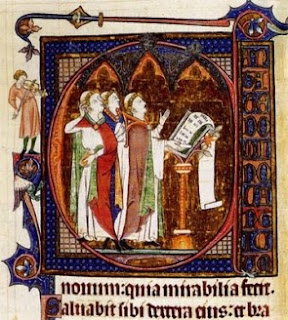By Paul B. Farrell, at MarketWatch, ht Christopher. I'm no economist, of course - but there's no question at all, to me, that something very important has changed in our culture and ethos. It seems to me that capitalism on the small scale - isn't that what "free enterprise" is? - has things to offer; I'm fairly certain it's responsible for bringing us - us, anyway - longer life and better medicine, for instance. It seems to have helped bring much of the world out of extreme poverty. And "free markets" - at least on the smaller scale - seem to be a good thing for freedom generally; better, at any rate, than imposing some arbitrary oligarchical system.
But it's clear that something important in the culture has changed. Americans, in particular, have become dis-attached from reality (and from ourselves) in many important ways. A simple example: the market-driven journalism that keeps Americans focused on self-absorbed trivialities and totally unaware of what's going on elsewhere in the world. Another: the totally dessicated (and utterly politicized) form of religion - Christianity in particular - that we see all around us. Another: no system exists any longer - outside of religion, where it's not functioning very well anymore, either - for people to address our own shortcomings and faults; instead, our very failings are exactly what "markets" exist to make money from.
Anyway, here's the article; I think it's beyond dispute that "our new dominating capitalist mind-set is crowding out 'nonmarket values worth caring about.'" I'm not sure which came first, though - the mindset or the crowding-out. I'm not sure it matters, either.
But it's clear that something important in the culture has changed. Americans, in particular, have become dis-attached from reality (and from ourselves) in many important ways. A simple example: the market-driven journalism that keeps Americans focused on self-absorbed trivialities and totally unaware of what's going on elsewhere in the world. Another: the totally dessicated (and utterly politicized) form of religion - Christianity in particular - that we see all around us. Another: no system exists any longer - outside of religion, where it's not functioning very well anymore, either - for people to address our own shortcomings and faults; instead, our very failings are exactly what "markets" exist to make money from.
Anyway, here's the article; I think it's beyond dispute that "our new dominating capitalist mind-set is crowding out 'nonmarket values worth caring about.'" I'm not sure which came first, though - the mindset or the crowding-out. I'm not sure it matters, either.
SAN LUIS OBISPO, Calif. (MarketWatch) — Yes, capitalism is working ... for the Forbes 1,000 Global Billionaires whose ranks swelled from 322 in 2000 to 1,426 recently. Billionaires control the vast majority of the world’s wealth, while the income of American workers stagnated.
For the rest of the world, capitalism is not working: A billion live on less than two dollars a day. With global population exploding to 10 billion by 2050, that inequality gap will grow, fueling revolutions, wars, adding more billionaires and more folks surviving on two bucks a day.
Over the years we’ve explored the reasons capitalism blindly continues on its self-destructive path. Recently we found someone who brilliantly explains why free-market capitalism is destined to destroy the world, absent a historic paradigm shift: That is Harvard philosopher Michael Sandel, author of the new best-seller, “What Money Can’t Buy: The Moral Limits of Markets,” and his earlier classic, “Justice: What’s the Right Thing to Do?”
For more than three decades Sandel’s been explaining how capitalism is undermining America’s moral values and why most people are in denial of the impact. His classes are larger than a thousand although you can take his Harvard “Justice” course online. Sandel recently summarized his ideas about capitalism in the Atlantic. In “What Isn’t for Sale?” he writes:
“Without being fully aware of the shift, Americans have drifted from having a market economy to becoming a market society ... where almost everything is up for sale ... a way of life where market values seep into almost every sphere of life and sometimes crowd out or corrode important values, non-market values.”
Sandel should be required reading for all Wall Street insiders as well as America’s 95 million Main Street investors. Here’s a condensed version:In one generation, market ideology consumed America’s collective spirit
“The years leading up to the financial crisis of 2008 were a heady time of market faith and deregulation — an era of market triumphalism,” says Sandel. “The era began in the early 1980s, when Ronald Reagan and Margaret Thatcher proclaimed their conviction that markets, not government, held the key to prosperity and freedom.”
And in the 1990s with the “market-friendly liberalism of Bill Clinton and Tony Blair, who moderated but consolidated the faith that markets are the primary means for achieving the public good.”
Today “almost everything can be bought and sold.” Today “markets, and market values, have come to govern our lives as never before. We did not arrive at this condition through any deliberate choice. It is almost as if it came upon us,” says Sandel.
Over the years, “market values were coming to play a greater and greater role in social life. Economics was becoming an imperial domain. Today, the logic of buying and selling no longer applies to material goods alone. It increasingly governs the whole of life.”Examples: New free-market capitalism trapped in American brains
Yes, it’s everywhere: “Markets to allocate health, education, public safety, national security, criminal justice, environmental protection, recreation, procreation, and other social goods unheard-of 30 years ago. Today, we take them largely for granted.”
Examples ... for-profit schools, hospitals, prisons ... outsourcing war to private contractors ... police forces by private guards “almost twice the number of public police officers” ... drug “companies aggressive marketing of prescription drugs directly to consumers, a practice ... prohibited in most other countries.”
More: Ads in “public schools ... buses ... corridors ... cafeterias ... naming rights to parks and civic spaces ... blurred boundaries, within journalism, between news and advertising ... marketing of ‘designer’ eggs and sperm for assisted reproduction ... buying and selling ... the right to pollute ... campaign finance in the U.S. that comes close to permitting the buying and selling of elections.”Why should you worry? Capitalism breeds corruption and inequality
But the 2008 crash challenged our faith in free-market capitalism: “The financial crisis did more than cast doubt on the ability of markets to allocate risk efficiently. It also prompted a widespread sense that markets have become detached from morals.”
Then comes the big question: So what? “Why worry that we are moving toward a society in which everything is up for sale?” Two big reasons concern Sandel:
First, inequality: “Where everything is for sale, life is harder for those of modest means.” If wealth just bought things, yachts, sports cars, and fancy vacations, inequalities wouldn’t matter much. “But as money comes to buy more and more, the distribution of income and wealth looms larger.”
Second, corruption: “Putting a price on the good things in life can corrupt them ... markets don’t only allocate goods, they express and promote certain attitudes toward the goods being exchanged.” Also “corrupt the meaning of citizenship. Economists often assume that markets ... do not affect the goods being exchanged. But this is untrue. Markets leave their mark.”Warning: Morals are new commodities auctioned to highest bidder
Sandel warns that our new dominating capitalist mind-set is crowding out “nonmarket values worth caring about. When we decide that certain goods may be bought and sold,” they become “commodities, as instruments of profit and use.”
But “not all goods are properly valued in this way ... Slavery was appalling because it treated human beings as a commodity, to be bought and sold at auction,” failing to “value human beings as persons, worthy of dignity and respect; it sees them as instruments of gain and objects of use.”
Nor do we permit “children to be bought and sold, no matter how difficult the process of adoption can be.” The same with citizenship ... jury duty ... voting rights ... “we believe that civic duties are not private property but public responsibilities. To outsource them is to demean them, to value them in the wrong way.”
Many things should never be commodities.America transforms from mere market economy to new market society
Sandel’s core message is simple: “The good things in life are degraded if turned into commodities. So to decide where the market belongs, and where it should be kept at a distance, we have to decide how to value the goods in question — health, education, family life, nature, art, civic duties, and so on. These are moral and political questions, not merely economic ones.”
Unfortunately, we never had that debate during the 30-year rise of “market triumphalism. As a result, without quite realizing it — without ever deciding to do so — we drifted from having a market economy to being a market society.”
And “the difference is this: A market economy is a tool ... for organizing productive activity. A market society is a way of life in which market values seep into every aspect of human endeavor. It’s a place where social relations are made over in the image of the market.” The difference is profound.
Not only did the debate never happen. It may never. Why? Because politicians aren’t up to debating values, may be pushing us past the point of no return.
Today’s “political argument consists mainly of shouting matches on cable television, partisan vitriol on talk radio and ideological food fights on the floor of Congress,” says Sandel, so “it’s hard to imagine a reasoned public debate about such controversial moral questions as the right way to value procreation, children, education, health, the environment, citizenship and other goods.”Dysfunctional politicians pushing Americans past point of no return
Can we change? “The appeal of using markets to put a price on public values, is that there’s no judgment on the preferences they satisfy.” Debate is unnecessary. Markets don’t “ask whether some ways of valuing goods are higher, or worthier, than others. If someone is willing to pay for sex, or a kidney ... the only question the economist asks is ‘How much?’ Markets ... don’t discriminate between worthy preferences and unworthy ones.” Markets may never draw the line, but do politicians, in secret?
What is certain: Capitalism is eliminating moral values, as Nobel economist Milton Friedman and capitalism’s philosopher Ayn Rand had been preaching to the generation. As Sandel puts it: “Each party to a deal decides for him- or herself what value to place on the things being exchanged. This nonjudgmental stance toward values lies at the heart of market reasoning, and explains much of its appeal.”
But unfortunately, market capitalism “has exacted a heavy price ... drained public discourse of moral and civic energy.”
The good professor is a great teacher, with only one glaring flaw in his logic: he’s too idealistic, too quixotic. You don’t have to be a fatalist to know that without a total economic collapse, market capitalists — including 1,426 billionaires, Wall Street bankers, hedgers, lobbyists and every other special interest getting rich off the new market society — will never voluntarily surrender their control over the American political system.
Rather, they will blindly continue down their self-destructive path with an absolute conviction they are divinely guided by the Invisible Hand of Adam Smith, and perhaps even God.
Meanwhile, we have no choice but wait patiently till the collapse, anxiously aware that our bizarre political system will just keep degrading America’s moral values, pricing, buying, selling, trading morals like commodities, because in the final analysis everything has a price and everyone has a price in our hot new exciting Market Society.




